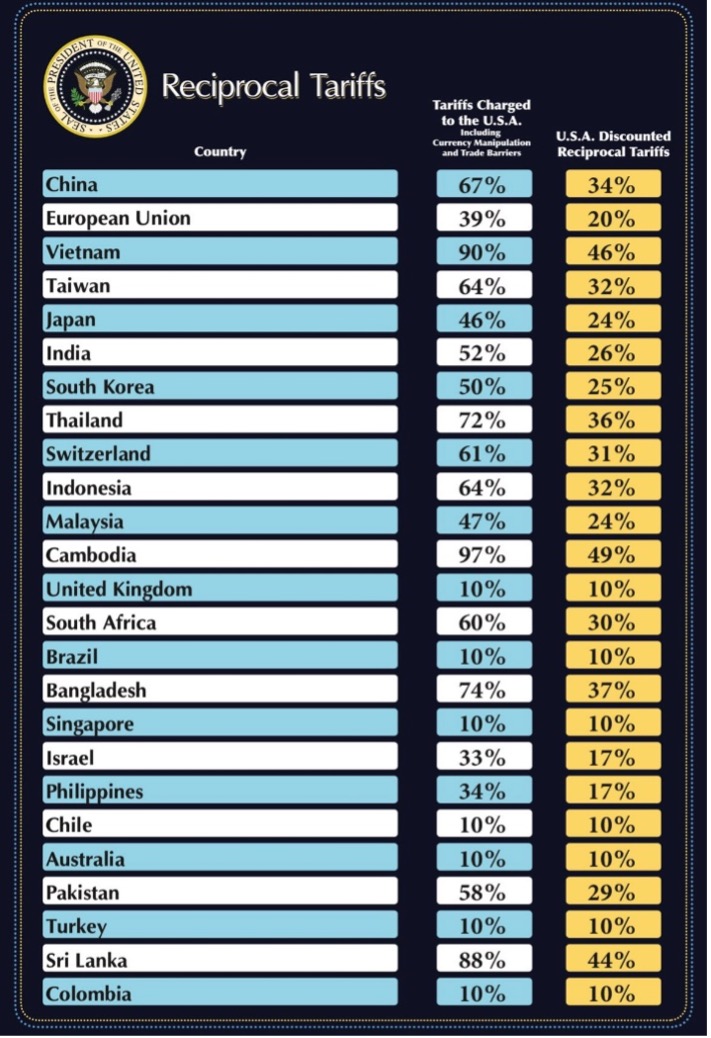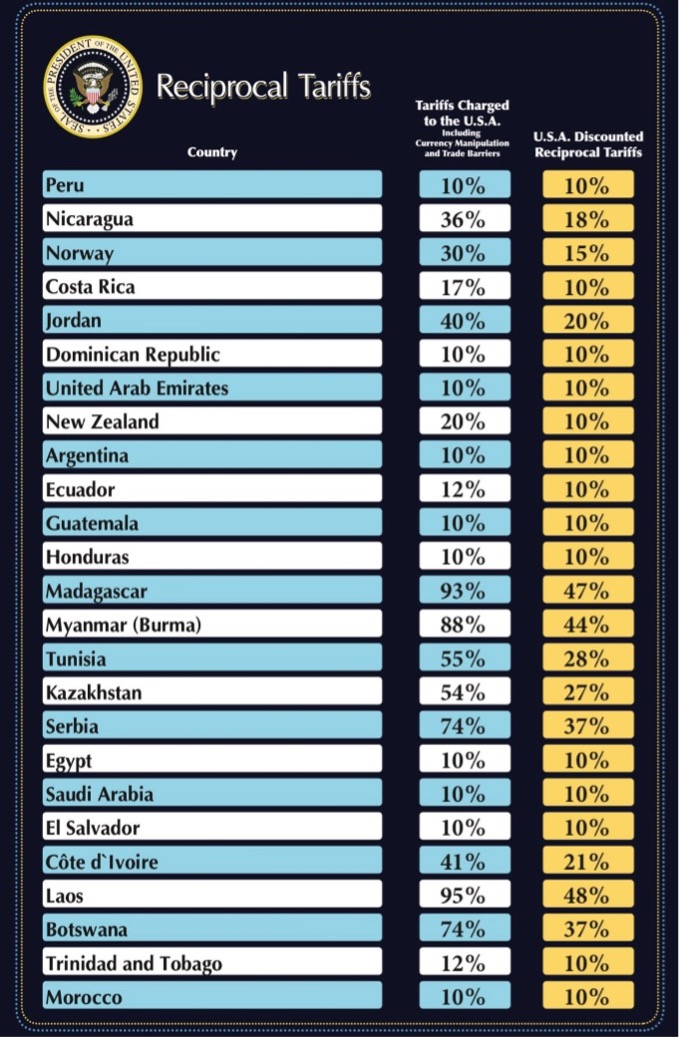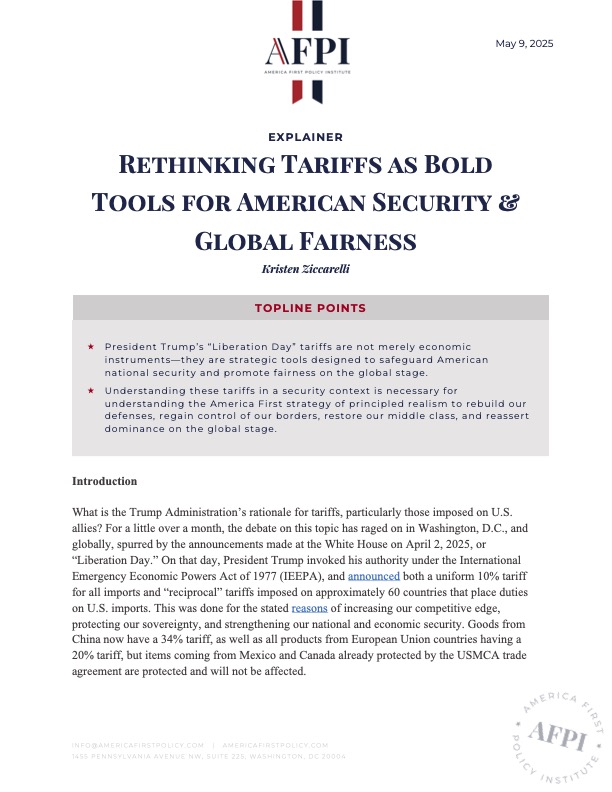America First Policy Institute
Rethinking Tariffs as Bold Tools for American Security & Global Fairness
Key Takeaways
« President Trump’s “Liberation Day” tariffs are not merely economic instruments—they are strategic tools designed to safeguard American national security and promote fairness on the global stage.
« Understanding these tariffs in a security context is necessary for understanding the America First strategy of principled realism to rebuild our defenses, regain control of our borders, restore our middle class, and reassert dominance on the global stage.
Introduction
What is the Trump Administration’s rationale for tariffs, particularly those imposed on U.S. allies? For a little over a month, the debate on this topic has raged on in Washington, D.C., and globally, spurred by the announcements made at the White House on April 2, 2025, or “Liberation Day.” On that day, President Trump invoked his authority under the International Emergency Economic Powers Act of 1977 (IEEPA), and announced both a uniform 10% tariff for all imports and “reciprocal” tariffs imposed on approximately 60 countries that place duties on U.S. imports. This was done for the stated reasons of increasing our competitive edge, protecting our sovereignty, and strengthening our national and economic security. Goods from China now have a 34% tariff, as well as all products from European Union countries having a 20% tariff, but items coming from Mexico and Canada already protected by the USMCA trade agreement are protected and will not be affected.


Figure 1 - Reciprocal Tariff Chart unveiled by the White House on April 2, 2025
Source: Thomson Reuters Tax & Accounting. (2025, April 3) What Trump’s global tariff announcement means for trade professionals
These tariffs have caused indignation, particularly among U.S. allies with the perception that their nation is being unfairly punished. But what must be understood is that President Trump’s tariffs are not merely economic instruments—they are strategic tools designed to safeguard American national security. The United States, under President Trump’s leadership, is using tariffs to reassert control over its economic sovereignty, reindustrialize its economy, and restore fairness to a global trade system that has long taken American openness for granted. In an era of rising geopolitical threats, weaponized supply chains, and industrial hollowing-out, tariffs are necessary mechanisms to put the American people first.
Alongside announcements of these tariffs, the White House has repeatedly stated that “access to American markets is a privilege, not a right.” The United States has one of the most open and generous economies in the world. With some of the lowest average tariff rates globally, we have allowed unfettered access to our markets under the assumption that free trade would lead to mutual benefit. Instead, this openness has often been exploited by countries that impose high tariffs on American goods, manipulate markets, or fail to enforce intellectual property protections. Just this week, speaking about the tariffs and other central issues like NATO and Ukraine, Vice President J.D. Vance reaffirmed that Europe and the U.S. were still “on the same team.”
However, the Vice President also emphasized that global fairness and reciprocity are not abstract principles, they are central to national resilience. If foreign nations tax our products heavily while expecting entry into our markets with minimal trade barriers, we have every right—indeed, a national obligation —to respond in kind. Beyond the questions of fairness, tariffs are necessary to reverse decades of deindustrialization that are leaving the entire West vulnerable in the event of a major worldwide conflict against our adversaries. In the U.S., offshoring of key manufacturing sectors has not only cost hundreds of thousands of American jobs—particularly in heartland communities like Ohio and Michigan—but it has also made us dependent on foreign powers for essential goods, including pharmaceuticals, steel, semiconductors, and energy infrastructure. So, rebuilding the industrial base isn’t just about economics, but about security. An economy that cannot produce its own weapons, medicine, or technology is an economy that cannot defend itself. President Trump understands what globalists ignored for decades: a strong manufacturing sector is the backbone of American power.
Tariffs as Leverage for Security
Tariffs are not an end in themselves—they are a means to an end. As President Trump has already shown, these tariffs have given the United States leverage in global negotiations, with more than 70 countries coming to the table in response. Whether it’s simply securing better trade terms in the U.S. interest or holding countries accountable for security threats (such as the flow of fentanyl from China and Mexico), tariffs give America a strong hand. On the whole, it is worth pointing out that immediately after announcing the tariffs, more than 100 countries contacted U.S. officials "to negotiate a solution to the subjects being discussed relative to trade, trade barriers, tariffs, currency manipulation, and non-monetary tariffs." Administration officials immediately began conferring with foreign counterparts on trade proposals and agreements.
Using tariffs as leverage is particularly critical with adversarial or uncooperative countries. For example, President Trump’s tariffs on China are a direct response to the Chinese theft of U.S. intellectual property, forced technology transfers, and complicity in the production of fentanyl precursors. Reportedly, the Chinese economy is already suffering, with its latest push to revive growth by using broader stimulus measures failing to uplift its stock market despite wide-ranging interest rate cuts and a major liquidity injection.
In the European Union, which continues to run a massive trade surplus with the U.S. and maintains high protectionist tariffs on American goods, President Trump's tariffs are a way towards fairer negotiations. The EU’s reaction to President Trump’s reciprocal tariffs exposes the double standard in transatlantic trade. In 2023, the overall trade balance was 52 billion euros in favor of the E.U., demonstrating how the bloc put up significant barriers for American agriculture, cars, and services. All car imports already had a 10% tariff imposed on them. In response, President Trump’s position is simple: if they tax our goods, we will tax theirs. Reciprocity is not only fair—it is long overdue. The German economy, as one example, has relied on trade surpluses for years with other nations like the U.S. to sustain their export-driven model. However, Germany’s dependency upon Russian gas and Chinese demand has left the country geopolitically exposed. President Trump’s tariffs have forced a reckoning: rather than rely on unsustainable imbalances, Germany should focus on internal growth, deregulation, domestic investment, and innovation. In the United Kingdom, President Trump and Prime Minister Keir Starmer unveiled a historic arrangement on May 8, 2025, resulting in the U.K. agreeing to buy more American beef, lower tariffs for cars coming from the U.K., and no tariffs on films or steel. All U.K. goods not covered in the deal would still be subject to the 10% tariff, to which the CitiGroup CEO said that most businesses could absorb this without issue.
At the signing of the deal, Prime Minister Starmer commented that it was a “really fantastic, historic day”—also coinciding with V-E Day, the 80th anniversary of the end of World War II in Europe. If negotiations with other nations, especially our EU allies, proceed in this manner, both the American and European people can expect long-term successes and wins on both trade and security.
Values & Restoring the American Way of Life
For many Americans, particularly blue-collar workers, globalization has not been a win-win proposition. As economists tout decreases in consumer prices, they ignore the fact that millions of Americans have lost careers, communities, and even cultural dignity as the jobs that once defined the American way of life are sacrificed to an unbalanced global system. That’s not to say that the U.S. shouldn’t continue to trade, but it must be done in the spirit of fairness and putting the American worker first. To put it another way, President Trump’s tariffs are a statement of values, affirming that we will not continue to outsource our identity for marginal economic gains. Revitalizing domestic industries means restoring the dignity of work and the stability of the American family. In just one success story of many, car companies like Honda, Volvo, and Isuzu, in response to the Mexico tariff threat, already announced decisions to move manufacturing back to the U.S.
American taxpayers should not forget that even if some costs are passed on to them as the consumer (though foreign producers will bear the brunt of the cost), the fact remains that tariffs generate revenue for the U.S. government. This money can be used to pay down our staggering national debt and fund other America First priorities, like tax cuts, mass deportations, and investing in critical infrastructure. Tariffs can help level the playing field while putting America’s fiscal house back in order.
Tariffs Are a Security and Values Doctrine, Not Just an Economic Policy
Critics of tariffs who say that President Trump is waging a trade war fail to realize that his plan unites American values, national security, and the economy in a bold grand strategy for the future. Tariffs are about rebuilding our defenses, regaining control of our borders, restoring our middle class, and reasserting American power on the global stage. Through the strategic use of tariffs, the Trump Administration is charting a course toward a more secure, self-reliant, and prosperous America.
References
